Background
Ken Dychtwald was born in 1950. He grew up in Newark, New Jersey, the United States.








(Explains the interrelationship of the body's parts, the m...)
Explains the interrelationship of the body's parts, the mutual shaping influence of body and mind, Eastern and Western approaches to the body-mind relationship, and available techniques of developing one's body-mind for enhanced well-being.
https://www.amazon.com/gp/product/0394410882/?tag=2022091-20
1977
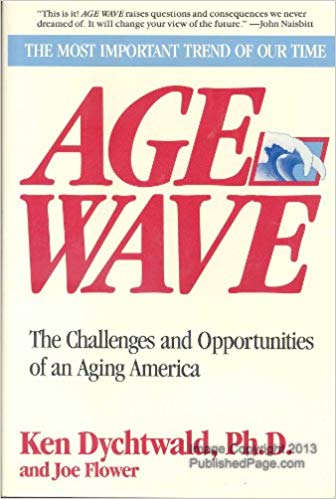
(Assesses the implications of an aging population on Ameri...)
Assesses the implications of an aging population on American society, addressing social, financial, political, medical, economic, educational, and personal factors.
https://www.amazon.com/gp/product/0874774411/?tag=2022091-20
1989
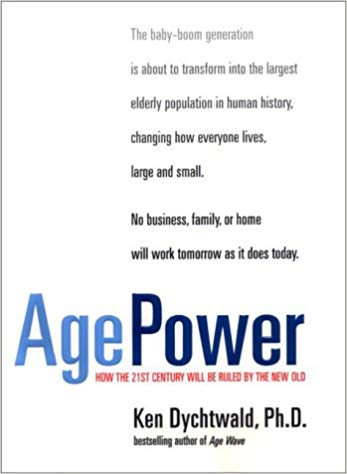
(The best-selling author of Age Wave and Bodymind explores...)
The best-selling author of Age Wave and Bodymind explores the implications of the aging of the baby-boom generation for American business, family life, health care, social institutions, and the political system.
https://www.amazon.com/gp/product/0874779545/?tag=2022091-20
1999

(In Healthy Aging: Challenges and Solutions, the nation's ...)
In Healthy Aging: Challenges and Solutions, the nation's leading experts, researchers, analysts, and educators present their frustrations, findings, insights, and recommendations on what current research reveals about the promise of healthy aging, how we are unprepared for the long-term chronic needs of an aging population, and why we need to rethink how the nation spends health care dollars.
https://www.amazon.com/gp/product/083421363X/?tag=2022091-20
1999

(Do you want to stop worrying about money and start having...)
Do you want to stop worrying about money and start having more fun? Do you wish you had more time to spend with family and friends? Do you want to live the life you always envisioned? Then it's time for your Power Years. The Power Years is your step-by-step guide to repowerment and personal reinvention after forty.
https://www.amazon.com/gp/product/B00DNL0TJA/?tag=2022091-20
2005
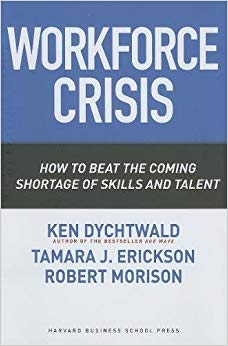
(Unprecedented shifts in the age distribution and diversit...)
Unprecedented shifts in the age distribution and diversity of the global labor pool are underway. Within the decade, as the massive boomer generation begins to retire and fewer skilled workers are available to replace them, companies in industrialized markets will face a labor shortage and brain drain of dramatic proportions.
https://www.amazon.com/gp/product/B001E57E2W/?tag=2022091-20
2006
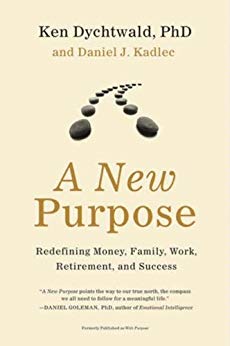
(Happiness in life is about more than what's in your bank ...)
Happiness in life is about more than what's in your bank account or stock portfolio. Success is more than achieving power and respect. Each one of us has a responsibility for changing the world in a positive, significant, and enduring way - and the challenge is less daunting than you might think. In this hopeful and motivating book, author Ken Dychtwald shares inspiring stories of people who have made a difference and points us to resources that will enable us to do the same.
https://www.amazon.com/gp/product/B003GYEGXE/?tag=2022091-20
2009
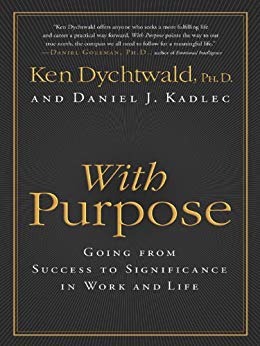
(A New Purpose, written by Ken Dychtwald, Ph.D., and Danie...)
A New Purpose, written by Ken Dychtwald, Ph.D., and Daniel J. Kadlec, redefines the American view of success, employment, retirement, and living a significant life. By providing both the inspiration and the information that will enable anyone to ensure that their time and influence have lasting and positive consequences, A New Purpose, as Daniel Goleman, author of Emotional Intelligence, sees it, “points the way to our true north, the compass we all need to follow of a meaningful life.”
https://www.amazon.com/gp/product/B001TKD4TY/?tag=2022091-20
2009
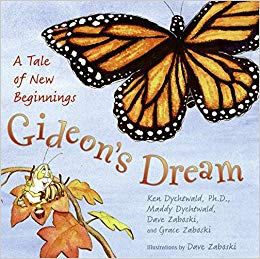
(Gideon goes to work high up in the trees, day in and day ...)
Gideon goes to work high up in the trees, day in and day out. But one day something remarkable happens - the leaf he is working on breaks free of the tree, taking Gideon on its flight. At first, Gideon is terrified, but as he glides gracefully through the air, his fear turns into sheer joy. What a rush it is to fly! After he lands, Gideon just can't get the experience out of his head. He dreams of once again soaring through the air and feeling so free. Will Gideon's dreams of flying ever come true, or is it just too late? Written by some of America's most visionary thinkers, Gideon's Dream is the story of one remarkable transformation.
https://www.amazon.com/gp/product/0061434973/?tag=2022091-20
gerontologist consultant psychologist speaker author
Ken Dychtwald was born in 1950. He grew up in Newark, New Jersey, the United States.
Ken Dychtwald received his Ph.D. in psychology from Union Graduate School.
Ken Dychtwald’s career centers around the aging of America. He began by being a leading proponent of healthy aging within the nonprofit community. In 1986 he founded Age Wave, LLC, a consulting firm that advises Fortune 500 companies on how to market to the over-fifty customer. Companies such as Johnson & Johnson, Coca-Cola, K-Mart, General Motors, American Express, Warner-Lambert, and AT&T have adapted Dychtwald’s theories to their marketing, advertising, development, and employment policies. Age Wave evolved into a business development incubator beginning in 1994 with ventures in publishing, marketing, nutraceutical food, and insurance. Dychtwald’s Age Wave Communications published the monthly magazine Get Up and Go! until the division filed for bankruptcy in 1999. He was a speaker at the 1998 and 1999 World Economic Forums in Davos, Switzerland, and is a frequent guest on radio and television programs.
In his 1977 book, Bodymind Dychtwald looks at the ways in which the condition of the body reveals the state of the mind. A Kirkus Reviews writer said Dychtwald’s method “consists of indiscriminately grafting together snatches of Western and Eastern philosophies - as well as more recent popular ‘self-development’ movements like est, sensitivity training, biofeedback training, etc.’’ Rosemary Feitis said in Library Journal that “Dychtwald’s judgments vary among the trite, the brash, and the questionable.” Feitis noted that the bibliography is extensive. “But, with all that,” she said, “we have learned very little.”
Millennium: Glimpses into the 21st Century is a collection of commentaries about the future edited by Dychtwald and Alberto Villoldo. Contributors include the editors, Jonas Salk, Carl Rogers, Jean Houston, Harvey Cox, and Frederik Pohl. Publishers Weekly reviewer Sally A. Lodge called it “a fairly tame book, with little wild-eyed speculation, very little of the surprising, the frightening, the enthralling.” Lodge said the exceptions are Timothy Leary on “Science,” Marilyn Ferguson on “Love,” and Arthur Hastings and Stanley Krippner on “Parapsychology.”
In Age Wave: The Challenges and Opportunities of an Aging America Dychtwald and Joe Flower consider the aging population and what changes will and should be made to accommodate the aging “boomers,” those born between 1946 and 1961 who represent one-third of the population, or seventy-six million people. At the time the book was published in 1989 the authors cited statistics that show that this group has been, and will continue to be, the driving force behind entire industries. Dychtwald, a boomer, was not yet forty when Age Wave was published.
In a Training & Development Journal article, the writer said that “likened to ‘a pig moving through a python,’ this generational mass has dominated American culture for four decades. When the boomers wet their pants, the diaper industry prospered. When they took their first steps, the shoe and photo industries skyrocketed. As the boomers suffered scraped knees and runny noses, a massive pediatric medical establishment arose, and Dr. Spock became a national figure.” Patricia Galagan interviewed Dychtwald for Training & Development Journal. He said that the number of Americans over age sixty-five now exceeds the number of teenagers. We are healthier and living longer, and future generations may expect to live to one hundred or older as new medical treatments and cures become available. Another demographic Dychtwald addressed is what he terms the “birth dearth.” It is estimated that twenty- eight percent of Boomers will have no children, and twenty-five percent will have just one. Dychtwald said that “some marriages may last as long as seventy-five years, while other people will have a different mate for each major stage of life. For most, till-death-do-us-part unions will give way to serial monogamy. With more divorces and longer lives, families blended of three, four, and even five generations with complex webs of intergenerational support and caregiving will become the norm.”
Ten years after Age Wave, Dychtwald published Age Power: How the 21st Century Will Be Ruled by the New Old. Library Journal reviewer Ellen Gilbert said that “there is nothing remarkably new here, but the book is a fairly complete package.” Susan Levine wrote in the Washington Post that “on the eve of his fiftieth birthday, Dychtwald’s still riding a crest. Only he’s not so cheery anymore. In fact, he seems depressingly worried. Right there, on Page 78 of his new book, Age Power, are the words Train Wreck. They’re on Page 79 too, and Pages 80 and 81, bold italics listing five looming disasters that could derail much of the next century.”
Dychtwald’s Train Wrecks include “Using sixty-five as a marker of old age - and the onset of old-age entitlements - is meaningless, unfair, and even dangerous;” “Without a dramatic shift in health care skills and priorities, our society will face epidemics of chronic disease;” “A caregiving crunch could become the social and economic sinkhole of the twenty-first century;” “Tens of millions of boomers are heading toward a poverty-stricken old age”; and “Without envisioning a new purpose for old age, we are creating an elder wasteland.”
Dychtwald advances business, product, and service ideas including bioimplants to monitor the body and deliver nutrients and hormones, androids that could interact with their elder owners, and housing that better meets the needs of the retirement community. He advocates “affluence testing” in Social Security and more portable pensions. He wants an increase in the monies spent on research of such diseases as Alzheimer’s, noting that fourteen million people could be afflicted with this and related diseases during the next century. Dychtwald talks about “age pioneers” like John Glenn, Alan Greenspan, Lena Horne, and Sean Connery (named one the world’s sexiest men at age sixty-nine) when talking about the potential for productivity in the later years. Levine concluded by saying that “for all his darker prognostications, Dychtwald is nothing if not an optimist.” Booklist reviewer Vanessa Bush called Age Power an “insightful look at the aging of the baby boomers.” a Publishers Weekly reviewer called it “a thought-provoking and worthwhile read.”
Dychtwald also published Healthy Aging: Challenges and Solutions in 1999. Thirty-six contributors address various subjects within the four sections that address еhe science of healthy aging, health care practices, healthy aging as a priority, and wellness and self-care. Luther P. Christman wrote in Nursing Administration Quarterly that the book “is useful to health care providers to stimulate the construction of health care formats that emphasize diet, exercise, and mental stimulation.”
Dychtwald was honored in 2015 by Investment Advisor Magazine as one of the 35 most influential thought leaders in the financial services industry over the past 35 years. He has twice received the distinguished American Society on Aging Award for outstanding national leadership, and American Demographics honored him as the single most influential marketer to baby boomers over the past quarter-century. Dychtwald's article in the Harvard Business Review “It’s Time to Retire Retirement” won the first place McKinsey Prize as the best article of the year. Dychtwald and his wife, Maddy Dychtwald, are the recipients of the Esalen Prize for their outstanding contributions to advancing the human potential of aging men and women worldwide. He was also awarded the Inspire Award from the International Council on Active Aging for his exceptional and lasting contributions to the active-aging industry and for his efforts to make a difference in the lives of older adults globally.
(In Healthy Aging: Challenges and Solutions, the nation's ...)
1999(Explains the interrelationship of the body's parts, the m...)
1977(Do you want to stop worrying about money and start having...)
2005(The best-selling author of Age Wave and Bodymind explores...)
1999(Assesses the implications of an aging population on Ameri...)
1989(Unprecedented shifts in the age distribution and diversit...)
2006(Happiness in life is about more than what's in your bank ...)
2009(Gideon goes to work high up in the trees, day in and day ...)
(A New Purpose, written by Ken Dychtwald, Ph.D., and Danie...)
2009Dychtwald expressed his negative opinion on Donald Trump. Especially on his racism and prejudice.
Dychtwald’s vision is that some people may never retire and that many will alternate between work, school, and leisure. The burden of Social Security will fall on the young who may find jobs unavailable as elders conеinue to work. Dychtwald also noted that we are a gerontophobic society. In other cultures, age connotes wisdom and knowledge. In the United States, we tend to deny our aging, although Dychtwald feels we are making some progress. He pointed out that Goethe completed Faust when he was over eighty, that Michelangelo was appointed to be an architect of St. Peter’s Cathedral in Rome when he was seventy-one, and that Pablo Picasso was still creating at ninety.
When Galagan asked where he thought gerontophobia is the most destructive, Dychtwald replied it was “in the media, which is so youth-obsessed; in marketing, which often portrays old people negatively; and in the workplace, where many young and usually well-meaning managers hold a variety of misperceptions about productivity and aging.” Dychtwald noted that older workers have fewer accidents on the job than younger workers, less absenteeism and lower turnover rates. Except for jobs that require considerable physical effort, older workers perform as well as, or better than, the young. He said that workers will also continue in the workforce past their present retirement age out of financial need, as Social Security will not provide enough income to maintain a reasonable standard of living. Employers are already offering older workers more incentives and partial benefits to part-time workers to fill a large number of jobs available. Dychtwald feels that the trend will continue into the future.
Former United States Secretary of Labor Ann McLaughlin wrote in the Los Angeles Times Book Review that “if today Americans are refusing to be drawn into a national passion about any one issue, I think we will find that this is because we are beginning to absorb the first vibrations of a change without precedent in our history - our passage from a young to a middle-aged society.” McLaughlin wrote that “the silent inexorability of America’s aging has allowed us to ignore its likely effects on the vast structure of law, regulation, and social services that we have constructed in the name of ‘rights’ and ‘security.’ Dychtwald touches on the unhappy potential by noting predictions of ‘intergenerational strife’ ... but then he wisely backs off. This is a complicated minefield, and he knows it.”
Joseph A. Kuchler wrote in Healthcare Financial Management that “for healthcare executives, the book’s primary weakness is its sketchy treatment of health issues. ... It touches on health issues only in the context of other subjects.” Futurist reviewer Timothy Willard said that Age Wave “is a highly readable and highly positive vision of what an older American could be.
Rather than providing a blueprint for a specific action, Dychtwald seems more determined to reassure and even inspire tomorrow’s elders that growing older can be a beautiful thing and could lead to a better world in the process.”
Quotations:
“Why don’t more people set goals? In general, psychologists point to seven reasons: They have not yet accepted personal responsibility for their lives. Many.”
“If we were to look closely at an individual human being, we would immediately notice that it is a unique hologram unto itself; self-contained, self-generating, and self-knowledgeable. Yet if we were to remove this being from its planetary context, we would quickly realize that the human form is not unlike a mandala or symbolic poem, for within its form and flow lives comprehensive information about various physical, social, psychological, and evolutionary contexts within which it was created.”
"Love seems to be the appreciation that we are all little lumps in the same earthly soup which is a little lump in a larger cosmic soup. So, love is an awareness of this beautiful energetic relationship and a natural appreciation of this situation. It doesn't seem to be a matter of finding love...it's a matter of being aware of it. It's not a question of the invention but rather a discovery."
"If I never explore my limits, my body-mind will gradually tighten and become unconscious. If I regularly explore my limits in a caring and adventuresome fashion, I will expand and grow in a vital fashion. But if I try to push myself past where I am honestly able to go, I will no longer be practicing yoga but instead will be practicing greed, and I will probably be met by pain and disease. Stated simply, it is the difference between ignoring your self, making love to yourself, and raping yourself."
Ken is married to Maddy Dychtwald.
